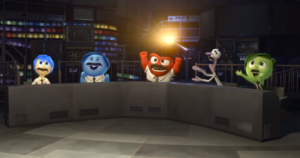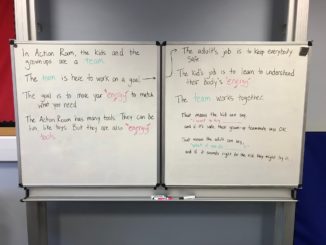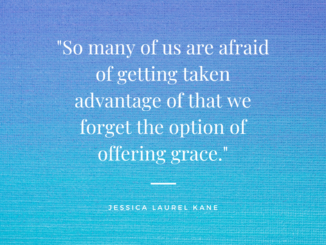My kids have been watching Inside Out recently. It’s a movie that takes place largely inside the characters’ minds from the point of views of their personified emotions. Everybody has the emotions Joy, Sadness, Anger, Fear, and Disgust.
If you haven’t seen it in a few years, it really holds up amazingly — there is sooooo much I could talk about about this movie from an OT and interoception perspective. I mean, as far as emotional intelligence goes, this movie just has layers and layers and layers.
One scene, though, majorly jumped out at me the first time I was re-watching it after having not seen it in years. I thought I’d write about it today.
Riley, the protagonist, is 11 years old. She and her family have just moved cross-country and are having a predictably stressful time (I say as someone who’s moved cross-country many times and internationally once!) She has a terrible first day at school, but is embarrassed about it and doesn’t want to tell her parents about it at dinner (partly because she thinks she’s supposed to be “putting forward a happy face” for her parents’ sake).
At dinner, her mom presses her for details about school, and she snaps back at her parents. Her father gets angry and “shows up” to the “fight” — really he’s the one who turns it into a fight, because he’s distracted with his own thoughts and doesn’t realize why she’s being sullen and irritable, or that he could ask what’s wrong.
What struck me in watching this scene was how Anger is the driving emotion in her father’s mind, and he’s the driving emotion in this scene — but Fear is actually equally present in this scene and in the dialogue. It’s almost 50/50 between Fear and Anger speaking for what the father does…which is yell at Riley and tell her to go to her room.
After having yelled at her and sent her away (fixing absolutely none of the problems she was having), Fear, in her father’s mind, is relieved and cheering.
That struck me as so painfully honest about a truth about parenting. It even manages to make it funny instead of just painful.
He was afraid of being “disrespected” by what his child was saying. He was afraid of the unusual amount of “sass” that he was hearing from her. He was AFRAID.
Fear is the driving factor in a lot of my snap judgments and reactions as a parent — fear, with anger on top, because fear feels too vulnerable to let drive by itself. It’s only when I let myself pause that I can react with more honest or open curiosity about what’s going on for the child.




